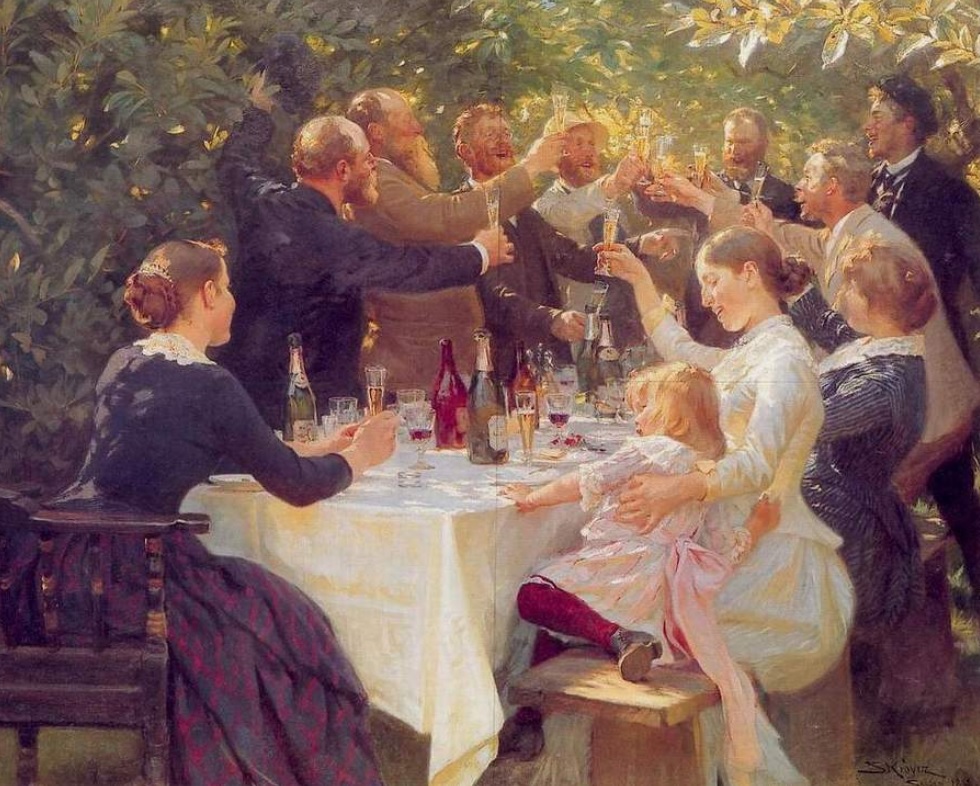After You: The Incredible But True Story of the Amazing Origins of Rituals of Niceness in Our Savage and Horrible and, Really, Kind-of-Embarrassing Pre-Modern Past
by Gene Spleicing
Rando House; 312 pp $29.95
Ever wonder why we touch glasses during a toast, or offer a blessing to one who sneezes, or stomp on someone’s foot when they hiccup? Anthropologist Gene Spleicing does, and his investigations into the origins of these and other acts of politesse have drawn back the curtain obscuring the veil on our prior assumptions of so-called “civilization.”
It turns out that practically every act of deference to another person has its roots in our wild animal nature and in brutal, thrilling olden times, when men were men and there weren’t any feminists. Spleicing has determined that:
- The custom of holding open the doors of cars or office buildings for ladies originated in Middle Kingdom Egypt, when two people arriving at a doorway simultaneously were obliged to punch and kick each other until one of them died. Because, as the art of the time illustrates, ancient Egyptians were two-dimensional creatures, such brawls usually lasted weeks—and, because pre-modern Egyptian astronomy was so wrong about everything, each week sometimes lasted years.
- The ritual of shaking hands began in medieval England, when two men encountering each other in a town, village, or city customarily produced whatever weapons they had on hand, exchanged them, and then fought until one surrendered. Over time, as weapons became bigger and heavier, they were left at home; persons encountering each other instead took to displaying open hands, with which they engaged in a slap fight to last not fewer than five minutes. (Hence the expression “all slapped out.”) This, too, evolved, into the mutual display and grasping of empty hands.
- Our habit of touching glasses when we salute or toast with beverages began among the Sumerians of Mesopotamia c. 3000 BC, when a 64-year-long drought made potable water a much-desired rarity. Persons at a bar or restaurant or night club lucky enough to have a mug of water would hold it aloft and say, in Mesopotamian, “Behold, I am about to quaff.” Any adult male in the vicinity was then permitted to stand and reply, “Give me that water, or I will beat you up.” The drinker then had the option of either ceding the drink or engaging in an elaborate fistfight that became known as “the Sumerian punch-out.” Over time, a custom arose in which others also possessing mugs of water were obliged to announce themselves, so that the original drinker knew he at least didn’t have to fight them. Because the vessels were opaque, one could never be sure that they actually held anything—hence the custom of touching rims, so that each drinker could confirm that the other really did have water in the mug, and wasn’t just pretending to so as to be able to sneak up on them later. This all sounds rather complicated and contrived, but the reader must remember that this is anthropology.
- Why do we say “God bless you” or “Health!” in Spanish or other invocations, when someone sneezes? The custom began in the Middle Ages, in Hamburg, Germany. In those days it was commonly thought that a sneeze meant that the sneezer had been invaded by evil spirits, and that they were being forcibly expelled onto other people. Hence, anyone in the vicinity of the sneezer was entitled to remonstrate with him (not her; women who sneezed were thought to be just doing it to get attention) and, if necessary, to threaten violence. It became customary to menace the sneezer with, “God help you if I get my hands on you.” (This, of course, was delivered in German, and consisted of one word fourteen meters long.) Over time this evolved into “God bless you,” in which “bless” was understood to be sarcastic. But by the early 18th century, the sense of sarcasm was lost; what had been a threat had been transformed into a blessing. “God bless you” morphed into “Gezundheit” (or “Health-hood”), which became the precursor to all the expressions of blessing, wishes of good health, and denunciations of evil with which we commonly respond to sneezing today.
Professor Spleicing’s book is replete with such colorful examples of mankind’s penchant for responding to pretty much anything with violence and combat. To read it is to think both, “How far we’ve come!” and “Or have we–?” The author, wisely, does not say.
